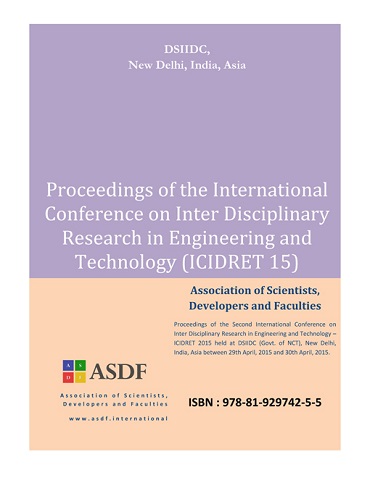- Publication Meta:Value
- Short Title:ICIDRET 2015
- Publisher:ASDF, India
- ISBN 13:978-81-929742-5-5
- ISBN 10:81-929742-5-1
- Language:English
- Type:Hard Bound - Printed Book
- Copyrights:ICIDRET Organizers/ icidret.org
- Editor-in-Chief:Kokula Krishna Hari K
- Conference Dates:29 - 30, April 2015
- Venue Country:New Delhi, India
- Submitted Papers:525
- Acceptance Rate:7.62%
- Website:www.icidret.in
Welcome to ASDF Electronic Digital Library!
ICIDRET 2015
ICIDRET 2015
International Conference on Inter Disciplinary Research in Engineering and Technology 2015
Paper 020
Methods Of Improving Higher Education Through Innovative Learning Models And Maintaining High Quality Standards
B R Senthil Kumar1, M Thiagarajan2
1Nehru Institute of Engineering and Technology,
2Anna University
Abstract
Education neither begins nor stops at the University. Higher education is concerned with the refinement of the mind, with living gracefully with partial knowledge. Today we are living in a knowledge world where intellectual capital plays a very important role. Educational Institutions being the home of intellectual capital can play a vital role in knowledge sharing and disseminating. The role of higher education in stimulating national economic growth and the value of international students to national economies exacerbates the need to ensure quality within Higher Education. These forces demand that quality assurance processes are both rigorous and transparent, and that quality enhancement initiatives are firmly embedded in any quality management programmer. Quality has begun to replace effectiveness as institutional level variable in higher education. Quality is the key for success and deploying quality in engineering education leads to better outcome for the institutions. One of the major tools that can be used in the graduate level to achieve the expectations of the recruiters is “QFD (Quality Function Deployment)”. Developing and scaling innovative learning models helps address education priorities by employing novel approaches to meeting student learning needs but in the same time one has to maintain the quality standards of education. Important strategies are necessary to achieve our nation’s education goals that include online and blended learning; high - access, technology - rich learning environments; and personalized learning models, e-learning, virtual learning, self-motivated project works, digital and open content. This research aims to provide the institutions of higher education a new dimensional teaching standard based on comprehensive quality standards that have been developed for each member of teaching in higher education institutions.
Keywords
Author's Profile
Author profile can be generated and linked through our partners World Book of Researchers. To include your profile online Click Here. After it is approved, please email to edlib @ asdf.res.in to create a link with all the papers.
e-AID
ICIDRET.2015.020
Cite this Article as Follows
Senthil Kumar B R, Thiagarajan M. Methods Of Improving Higher Education Through Innovative Learning Models And Maintaining High Quality Standards. International Conference on Inter Disciplinary Research in Engineering and Technology 2015. Vol. 1. Chennai: Association of Scientists, Developers and Faculties, 2015. 130-136. Print.
© 2010 - by EDLIB .
All Rights Reserved.

